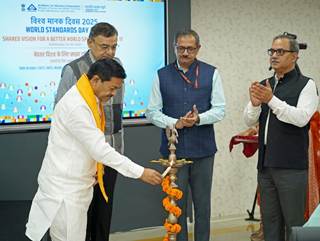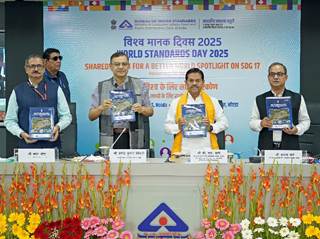Ministry of Consumer Affairs, Food & Public Distribution
World Standards Day 2025
Government Harmonizes QCO Framework to Support MSME; And Curb Substandard Goods: Union Food and Consumer Affairs Minister
BIS Should Strengthen Consumer Initiative and Outreach: Shri Pralhad Joshi
Posted On:
14 OCT 2025 4:57PM by PIB Delhi
The government is harmonizing the scope of Quality Control Orders (QCOs) for mandatory certification to curb the circulation of substandard goods while being considerate towards the requirements of the domestic MSME sector. Union Minister of Consumer Affairs, Food and Public Distribution and Minister of New and Renewable Energy Shri Pralhad Joshi stated this at the celebration of World Standards Day 2025 organized by the Bureau of Indian Standards (BIS) today. While virtually addressing the event he emphasized that BIS must achieve a sustainable balance between these two objectives.
Shri Joshi highlighted that over the past 11 years, India’s economy has risen from the 10th position to the 4th position, a remarkable achievement driven by the government’s philosophy of Reform, Perform, and Transform. He said that India is now moving confidently towards becoming the third-largest economy in the world by 2028. The BIS has played a key role in realizing this vision by aligning national standards with global benchmarks.
He noted that standards form the backbone of a well-functioning society, ensuring safety, quality, and trust across products, services, and systems. They facilitate seamless domestic and international trade, enhance environmental sustainability, and protect consumer interests. By adhering to standards, India strengthens the reliability of its products and its position in global markets.
The Minister said that this year’s theme, Shared Vision for a Better World, focusing on SDG-17 (Sustainable Development Goal 17)– Partnership for the Goals, highlights the importance of collaboration in achieving sustainable development. BIS, as the national standards body, has made significant progress by adopting global best practices while keeping national interest at the core. New and emerging sectors such as renewable energy, electric mobility, digital infrastructure, and sustainable materials are being actively addressed.
Shri Joshi congratulated BIS for organizing the celebration of World Standards Day 2025 and said that under the leadership of Prime Minister Shri Narendra Modi, India is moving ahead with renewed purpose to ensure that every citizen has access to safe, reliable, and high-quality products and services.
The Minister reiterated that the Prime Minister has given a clear direction through his call for zero defect and zero effect, promoting products that are flawless in quality and harmless to the environment. He said that Bharat must be recognized globally for its quality and that Indian standards should become synonymous with international standards.
Shri Joshi informed that over 22,300 standards are currently in force and that 94 percent of Indian standards have been harmonized with ISO (International Organization for Standardization) and IEC (International Electrotechnical Commission) standards. The number of new standards formulated has increased from 407 in 2014 to 1,038 in 2025. Products under mandatory certification have also grown from 106 products under 14 QCOs in 2014 to 773 products under 191 QCOs plus two horizontal QCOs in 2025.
Further the Minister commended BIS for its efforts in hallmarking gold jewellery, stating that the introduction of HUID-marked jewellery has set new benchmarks in consumer protection and trust. He encouraged the industry to participate more actively in the standardization process to make standards more practical, dynamic, and future-ready.
He expressed confidence that BIS will emerge as one of the leading national standards bodies in the world, setting benchmarks in quality, safety, and sustainability. He urged BIS to continue fast-tracking the development of standards, particularly in national priority areas, to keep pace with rapid technological advancements.
The Minister also called upon BIS to strengthen its consumer outreach and publicity initiatives to ensure that citizens in both urban and rural areas are aware of the importance of standards. He emphasized the need to focus on quality to achieve the vision of Atmanirbhar Bharat and Viksit Bharat, while promoting innovation, indigenous technology, and sustainable industrial growth. He further encouraged all stakeholders to adopt the Swadeshi campaign and extended his best wishes for the continued excellence of BIS.
Addressing the gathering Minister of State for Consumer Affairs, Food and Public Distribution, and Social Justice and Empowerment Shri B. L. Verma, lauded the contributions of experts driving India’s standardization movement. He said the day celebrates the tireless efforts of those shaping global standards that guide industries and the economy. Emphasizing the importance of global standardization in promoting growth and collaboration, Shri Verma applauded the “Standardization Heroes of India” for ensuring balanced development of standards and certifications. He also highlighted BIS’s active role in ISO and IEC, which has strengthened India’s global standing and harmonized national standards with international benchmarks.
Present on the occasion were Director General, BIS, Shri Pramod Kumar Tiwari, Additional Secretary, Department of Consumer Affairs, Shri Bharat Khera, OSD, BIS, Shri Sanjay Garg; and other senior officers of the Bureau.
Several key initiatives aimed at advancing standardization, transparency, and digital transformation in India’s quality ecosystem were also launched at the event including the release of the National Lighting Code of India: 2025. First published in 2010, the National Lighting Code (NLC) consolidates best practices for designing, selecting, installing, and maintaining lighting systems in both indoor and outdoor spaces. Since then, the lighting landscape has evolved significantly. Scientific research has revealed the profound influence of light on human mood, circadian rhythms, behaviour, and long-term health. The widespread adoption of digital lighting, IoT-enabled smart systems, and renewable energy solutions has made updated guidelines imperative, while ecological concerns about excessive or poorly designed artificial lighting have become increasingly urgent. Recognizing these developments, the Illumination Engineering and Luminaires Sectional Committee (ETD 49) of BIS undertook a comprehensive revision of the NLC. The revised Code, now organized into sixteen parts, addresses key advancements such as the transition from conventional sources like fluorescent and halogen to LEDs and solid-state lighting, the rise of smart, connected systems enabled by IoT, and the integration of lighting with renewable energy. It also covers specialized lighting applications for tunnels, heritage sites, healthcare, horticulture, and germicidal uses, while exploring new areas such as human-centric lighting, UV-based disinfection, and solar-powered systems.
A Pilot Project for Capturing the Weight and Photograph of Hallmarked Jewellery across 25 Assaying and Hallmarking Centres (AHCs) was also launched. This initiative aims to enhance transparency in the hallmarking system by digitally recording the photograph and weight of each hallmarked jewellery item in the BIS portal. Cameras configured with the system will capture clear images of both the jewellery article and its HUID separately, while weighing balances at each AHC will be integrated to automatically record weight data, eliminating manual entry errors. Consumers will be able to verify the authenticity of hallmarked items by viewing the recorded photograph and weight on the BIS Care mobile application, promoting transparency and informed decision-making. The pilot project will be implemented for one month across 25 selected AHCs before being scaled up for pan-India rollout.
Another major initiative launched was the Integration of Laboratory Equipment with the BIS Laboratory Information Management System (LIMS). BIS laboratories, along with BIS-recognized external and government laboratories, are using the LIMS developed by BIS to streamline digital operations across all testing facilities. In a significant step toward enhancing efficiency, more than 180 instruments and analytical systems—spanning chemical, mechanical, electrical, microbiological, and food testing—have now been digitally interconnected through the LIMS. This integration allows automatic transfer of data from instruments to the system, reducing human intervention, ensuring consistency, and enhancing traceability. It also shortens analysis time, increases reliability, and reinforces confidence in BIS testing and certification processes, while supporting the government’s Make in India and Digital India initiatives.
The event also saw the launch of the Learning Management System (LMS) by BIS. The LMS offers online, self-paced certificate courses on Indian Standards and conformity assessment procedures, designed to enhance awareness among industry professionals and quality control personnel through digital learning. Each course comprises sequential modules covering relevant standards, testing methods, production processes, and failure analysis. Learners can access the platform via web or mobile devices and use a Clarification Forum to interact with subject matter experts. Upon successful completion of module quizzes and a final assessment, participants will receive a verifiable, barcoded digital certificate. The LMS also maintains detailed training records and provides customizable reports, promoting capacity building in the field of standardization and quality assurance.


***
RT/ NS/ SA/ IB
(Release ID: 2178951)
Visitor Counter : 2745